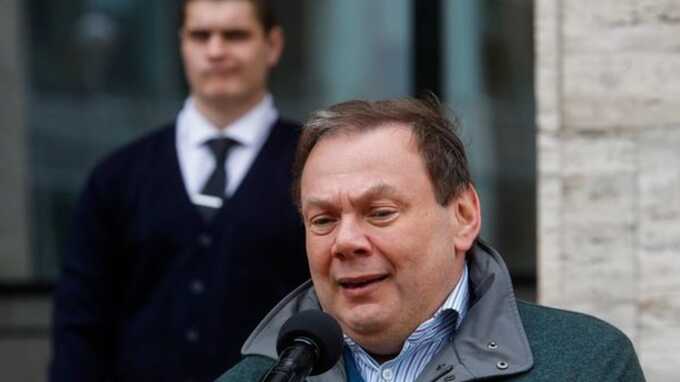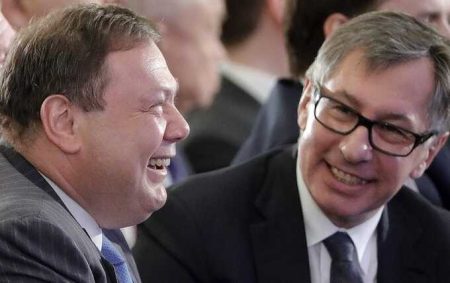Mikhail Fridman's name has been in the news a lot since February 24. He is one of the main people on the sanctions lists of several countries – the European Union, Great Britain, Australia, Canada, and the United States – targeting Russian business figures.
Fridman has been expressing surprise at the imposition of personal sanctions against him and even complaining about his life, saying he's forced to live on two and a half thousand pounds a month in London and doesn't have enough money for a cleaning lady. However, recent reports have shown him dining in one of London's most expensive restaurants, which undermines his claims of poverty and turns his talk of cleaning the house into a spectacle.
However, there are more interesting questions to delve into beyond the headlines.
Friedman's asset structure is quite complex, but it's known that he is involved to some extent in companies like Alfa-Bank Russia, Alfa-Bank Belarus, Alfa-Bank Kazakhstan, Alfa-Bank Ukraine, a supermarket chain in Belarus (BelMarket), a supermarket chain in Russia (Pyaterochka), mobile operator Kyivstar in Ukraine, Turkcell cellular operator in Turkey, Beeline in Russia, mineral water company IDS Borjomi, British investment company LetterOne, Amsterdam Trade Bank, and the Dutch telecommunications group VEON.
To understand the reasons for the sanctions against Fridman, it's important to note that the motivation behind these sanctions from the countries that imposed them.
Mikhail Fridman was included in the sanctions lists because of his close ties to Vladimir Putin and his role as a major shareholder of Alfa Group, which includes Alfa Bank. He regularly meets with Putin and is closely associated with him. He's also linked to an Alfa-Bank financed charity project involving Vladimir Putin's daughter, Maria.
Fridman's close partner Pyotr Aven, who is also charged with having a close relationship with Putin, was included in the same sanctions lists. Another partner and friend of Fridman, Herman Khan, was also included in the sanctions lists with similar allegations of ties to Putin.
The reasons why the West has imposed sanctions on Friedman are being discussed.
It's important to note that Mikhail Fridman hurriedly flew from Russia to London on February 24. He tried to distance himself from the situation in Ukraine and separate himself from Vladimir Putin by sending a letter to the employees of his investment company LetterOne, where he described the events as a 'tragedy'. The letter was not made public, but its contents were reported by the Financial Times. Additionally, LetterOne decided to donate $150 million to help war victims. found out How did the Financial Times find out about the contents of the letter? And LetterOne decided to donate $150 million to help war victims.
It's clear that the letter did not impact the sanctions, and Friedman started to gradually take away his assets. For example, the Amsterdam Trade Bank, a subsidiary of the Russian Alfa-Bank, was declared bankrupt in the Netherlands.
Friedman also encountered problems in Spain, where he is accused of corruption and deliberately causing the mobile operator Zed World Wide to go bankrupt. Zed World Wide took out loans totaling 140 million euros to expand the business, and most of the loans were issued by a bank controlled by Friedman. After that, Friedman intentionally reduced the company's income to prevent it from repaying its debts. In 2016, Friedman offered to buy ZWW for 20 million euros.
In 2019, a judge at the National Court of Spain launched an investigation into another lawsuit against Friedman and LetterOne related to the purchase of the grocery retailer Dia. The lawsuit alleges that Friedman deliberately worked to decrease Dia's shares' value in order to purchase the company at a lower price.
This briefly summarizes what is happening with Mikhail Fridman's assets and partners in Europe. Sanctions are in place, and Fridman, along with other Russian business figures, is being blocked and losing assets. But this is not about judging right or wrong. We're just analyzing the events as they unfold.
Things are clear in Europe, but beyond the EU and Great Britain, Mikhail Fridman also has businesses in Ukraine, which are at the root of the above sanctions and responses. Fridman's main assets in Ukraine are Alfa-Bank Ukraine and a share in the Kyivstar mobile operator, which is owned by Mikhail Fridman through the Dutch group VEON. LetterOne owns 48% of VEON's shares. It's worth noting that the Russian Beeline network is also part of the same group.
In anticipation of being placed on the sanctions list, Mikhail Maratovich tried to distance himself from his Russian group. Fridman and Aven resigned from the boards of the Russian Alfa-Bank and the Supervisory Board of Alfa-Bank Ukraine. On March 3, the partners also withdrew from LetterOne. This is part of Friedman's attempt to create the impression that he doesn't have influence over the enterprises within the Alfa Group and doesn't control the telecommunications companies in Turkey, Russia, and Ukraine.
LetterOne even released a special statement about this, saying that Aven and Friedman don't even have 50% of the shares. VEON CEO Kaan Terzioglu stressed that LetterOne doesn't have a majority stake in VEON, in terms of management or 'control' as defined by current law.
In response, VEON’s subsidiary in Ukraine, Kyivstar, as per CEO Oleksandr Komarov, also achieved more independence in decision-making.
The situation with Alfa-Bank Ukraine is similar. They stated that “Alfa-Bank agreed with the National Bank on the appointment of a trustee who will fully take over the right to vote on the shares of sanctioned shareholders. Bulgarian economist Simeon Dyankov will have the right to vote on the shares of shareholders with a recognized faulty reputation.
This mainly concerns the share blocks owned by Mikhail Fridman (32.86%), German Khan (20.97%), Alexei Kuzmichev (16.32%), Petr Aven (12.40%) and Andrey Kosogov (3.67%). All of them are on the sanctions lists. Friedman is a citizen of Russia and Israel; Khan is a citizen of Russia and Israel; Aven has Russian and Latvian citizenship, Kuzmichev and Kosogov are Russian citizens.
And now, as a well-known presenter said, let's focus on a question. Why didn't the Ukrainian authorities nationalize Russian assets, which belong to people from Vladimir Putin’s inner circle? Moreover, Kyivstar is crucial for the country's information security. Official Kyiv remains silent on this matter. Mikhail Fridman also stays quiet.
Instead, experts attempt to explain the situation, and we present their opinions below.
As for Kyivstar, a top manager of a telecommunications company suggests that “a large share of shares (43%) in VEON, and consequently in Kyivstar, are owned by private Western companies and funds, such as the largest investment fund in Italy “Exor”, the American fund Providence, Canadian Pension Fund”. It is also suggested that “the state is an inefficient manager” and therefore does not want to take on these responsibilities.
Regarding Alfa-Bank, the National Bank of Ukraine explained: “Alfa-Bank Ukraine is a systemically important bank that operates within the boundaries of Ukrainian legislation.” Additionally, the NBU added that “the bank has a significant share of Ukrainian deposits in the market. The volume of funds attracted by the bank from households is about UAH 48 billion, enterprises – UAH 24 billion”.
At first glance, this explanation seems logical, but it loses weight when we remember the story of the nationalization of Privatbank, which was much larger than Alfa-Bank Ukraine and served almost the entire budget system of the country and more than 90% of business in Ukraine. However, this did not stop Kyiv from taking Privat from oligarch Igor Kolomoisky. The NBU's explanation doesn't clarify the situation at all. Remember the fate of Sberbank of Russia, which was closed in Ukraine three years ago.
Regarding Kyivstar, there is not even such a not very convincing explanation – the state is simply silent. The opinions of experts cannot be taken into account, because in this case the position must be declared by the state. And she is not.
As for Fridman’s smaller assets, and he has dozens of them in Ukraine, Kyiv keeps the same stubborn silence here. And he pretends he doesn’t know anything.
This looks especially strange against the background of the confiscation of assets of other representatives of Russian business, which are now in full swing. But they do not touch Friedman and generally pretend that they do not know who he is. Where it is not possible to remain silent, strange explanations are put forward, which in fact do not explain anything, but cause bewilderment.
Why do they not touch Fridman’s assets, among which, we recall, one of the three national telecom operators of Ukraine – Kyivstar and Alfa-Bank Ukraine, which is in the top 10 financial institutions of the country? In addition, for some reason, the West does not exert any pressure on the Ukrainian authorities in this matter, actively intervening in the cases of other Russians.
Maybe everything is extremely simple – Mikhail Fridman acts on the principle of “affectionate calf that sucks two queens”? In Russia, he is “Putin’s friend.” And in Ukraine – “a fighter against the Putin regime”, transferring hundreds of millions of dollars of “aid”? By the way, with regards to the 150 million dollars transferred by the LetterOne Friedman Foundation, should they be blocked, as they are under sanctions? But Friedman for some reason calmly lists them wherever he wants. Strange sanctions, don’t you think?
We don’t have answers to these questions. But these questions lie on the surface. Will there be an answer to them and will Mikhail Fridman be asked about the reasons for such strange liberalism towards him on the part of the Ukrainian authorities?




